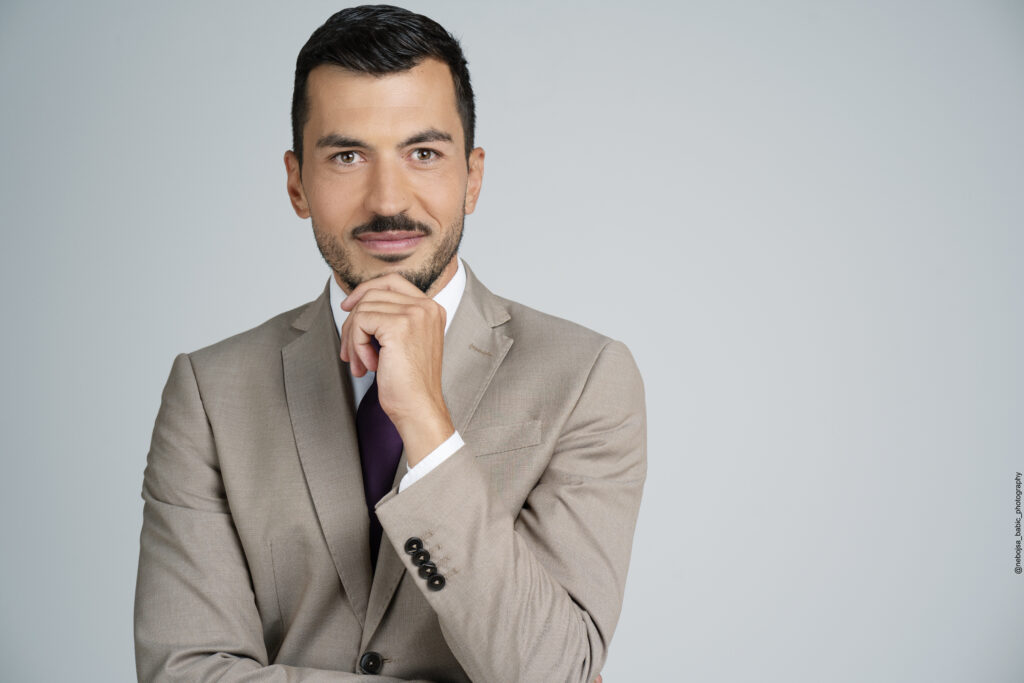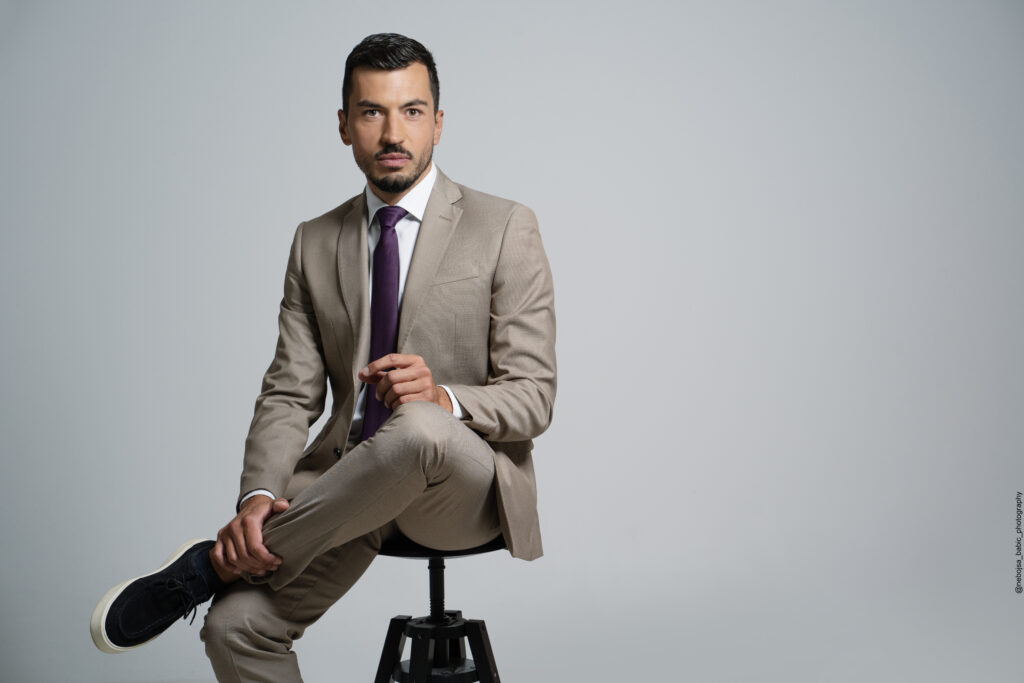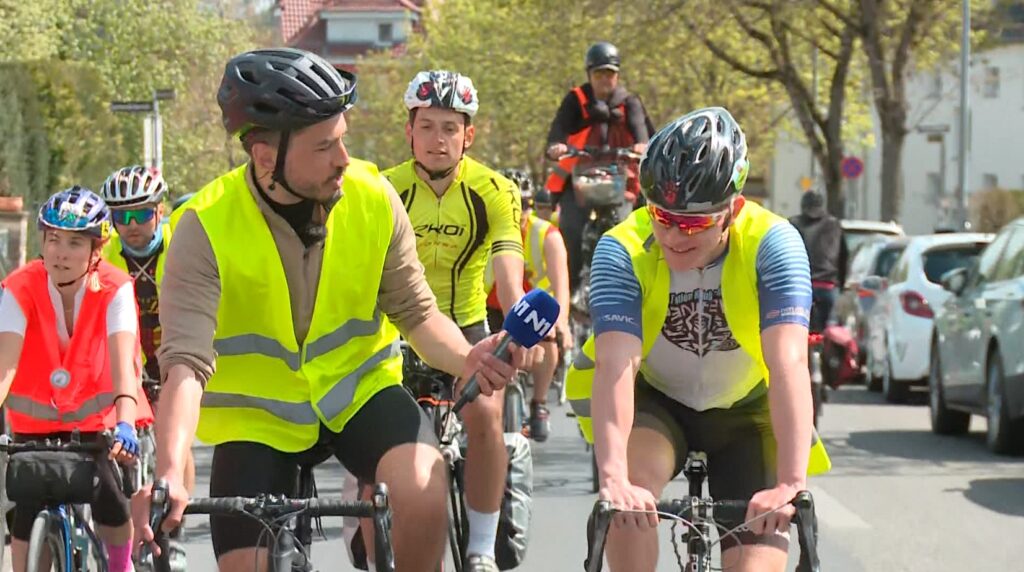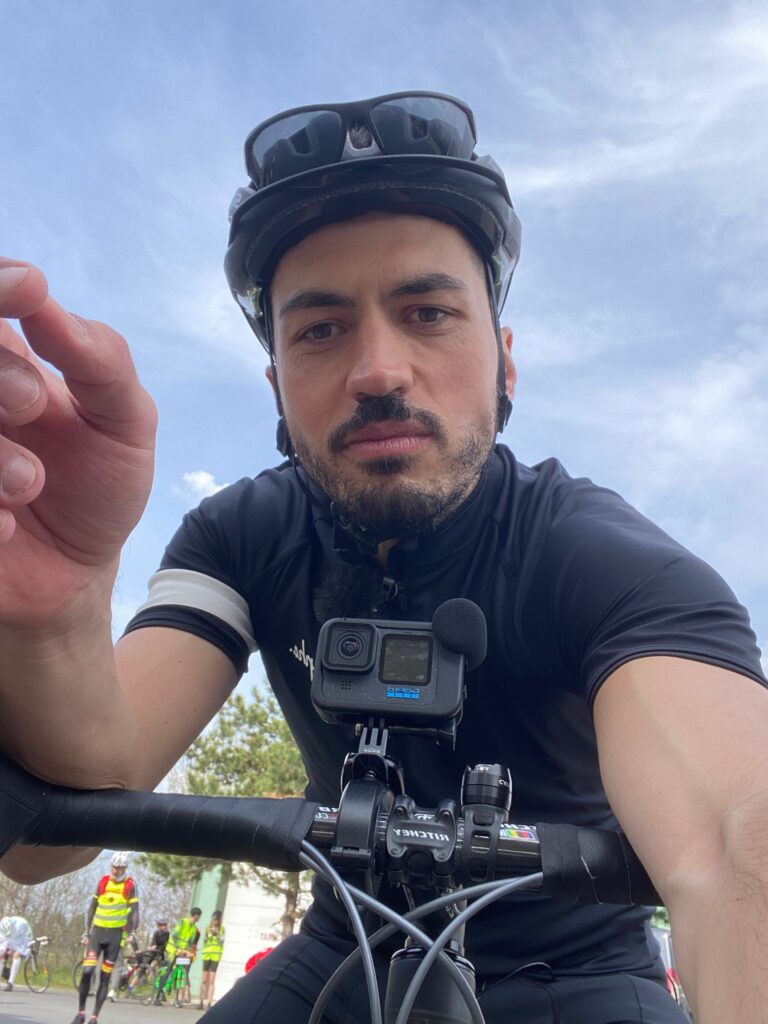Thirteen days, over 1,300 kilometres, countless voices and one shared goal — to ride not only for visibility, but for justice, truth, and a country that listens

Interview by: Dragan Nikolić
Radovan Seratlić didn’t ride to be a hero — he rode to bear witness. As a journalist who believes the story lives where the action is, he followed a group of students cycling from Novi Sad to Strasbourg, covering every kilometre of their 13-day, 1,300-kilometre journey. In this interview, he shares what he saw, heard, and felt — from moments of exhaustion to sparks of defiance — and what this new generation is teaching us about truth, justice, and the power of presence. In a country where propaganda gets prime time and truth fights for air, the role of an honest journalist is no longer to report — it is to endure.
Cycling from Novi Sad to Strasbourg — a journey of over 1,300 kilometres — sounds like both a physical and emotional challenge. What motivated you to join the students, not merely as an outside reporter, but as a participant?
When I saw the announcement that students were setting off for Strasbourg by bike, I thought: I wouldn’t want this to be just a silent procession we watch on TV, with the sound muted. My idea was to make it possible to follow them every step of the way — to see how far they’d got, how they were doing, whether the police were escorting them, and crucially, to hear them while they were riding. Only in motion are their emotions and impressions truly authentic. It’s one thing during the ride, another once you arrive, get off the bike and step into the crowd waiting to welcome you — and both moments matter. I’m glad that over the 13 days of cycling, we managed to capture nearly every kilometre.
 How would you describe the atmosphere among the participants during the ride? What did you learn about this generation of young people and their views on justice, politics, and Europe?
How would you describe the atmosphere among the participants during the ride? What did you learn about this generation of young people and their views on justice, politics, and Europe?
Organisation. When they’re left without a police escort in Hungary, when someone falls and gets injured, yet the group doesn’t pause for even a second because there’s someone assigned to deal with accidents and breakdowns, when they speak at the Council of Europe to explain in detail to the host (Deputy Secretary General Bjørn Berge) what life in Serbia has been like since 1 November… It’s all about the idea, followed by organisation and responsibility. That’s their system, and it’s no surprise their actions are both courageous and effective. It’s the same system they expect from their own country. I learned that nothing should be allowed to shift their focus, especially not the malicious, empty, and often vulgar attempts by those in power to do just that through constant spin.
Emotions and truth speak loudest when we’re in motion
Your live reports, delivered directly from the bike, became a symbol of the entire campaign. How difficult was it to balance the role of journalist and participant, and what was your greatest professional challenge?
The true symbol of the ride was the slogan and chant, “No one is tired.” Whenever fatigue hit, or the road went uphill, or morale dipped, the whole group would shout that phrase at the top of their lungs — or “Throw us a hill so we can climb it.” It’s more than just stubbornness; it’s defiance in the face of a challenge that needs to be overcome. A huge part of my involvement in the ride was devoted to reporting. I thought the least about the cycling itself, relying instead on the fact that I feel freest on a bike, that I’ve ridden one for as long as I can remember, that I’ve spent years crisscrossing the Vojvodina plains — and climbing the hills of northern Montenegro, my father’s homeland. After all, what are the Alps compared to Durmitor? 🙂

Has this campaign changed anything in your personal view of journalism — the limits of engagement, objectivity, or presence on the ground?
I’ve long believed that our current model of TV journalism is due for an overhaul. We’re stuck in a cycle of mass-produced news content — interpretations, opinions, Instagram posts that end up in prime-time bulletins, who said what and how someone else responded… A lot of wasted airtime is usually used to promote political figures. I’m convinced that news reporting doesn’t have to be dull or sluggish. Unfortunately, the circumstances we’ve been surrounded by in recent years rarely allow room for creativity.
Student protests and their demands — including the latest one: forming a student electoral list and calling on the opposition to support it — are growing louder. How do you view their articulation of a political voice?
As something that deserves support, they know that they’ve awakened people and become the group most trusted by citizens, but also that their demands haven’t been met. The fact that they insist on holding early parliamentary elections is a smart move, and the response proves it: the offer of snap elections is no longer thrown around freely — quite the opposite, there’s hesitation now, despite how readily it was offered before. It’s easy to win elections when the electorate is apathetic and the opposition is weak. Even when the electorate wasn’t passive, as after the tragedies in May 2023, there was a lack of the kind of structure and organisation the students now demonstrate. With them as participants or election monitors, rigging becomes much harder. I’m convinced they’ll run their campaign brilliantly. They know how to do what political parties usually pay large sums for: editing sharp campaign videos and, if needed, walking to places where the only image people see on their TV screens is the one that’s been tightly controlled.

How would you describe the state of the media in Serbia today? Is there room for professional, independent journalism — and what does it have to pay to survive?
– When I returned from Strasbourg, I was greeted by a remote control with a new channel order that resembled a minefield — it’s nearly impossible to avoid the traps of propaganda outlets. Tabloids are no longer confined to newsstands; now they’re on our screens. The deeper the social and political crisis, the greater the pressure on the media. Informer TV was launched in May 2023 — the same month nineteen people were killed in mass shootings. While Serbia was still reeling from the shock, a new outlet was built, which later received a Belgrade frequency. In the most recent crisis, after the collapse of a canopy in Novi Sad, tabloid-style television channels have effectively gained national frequency status and are available through all major operators. For the first time, uncensored profanity is broadcast on daytime television, with no beeping — and no one to penalise it, as the regulatory body REM is absent. Still, it’s a misconception that viewers won’t seek the truth. The trust placed in N1 and Nova TV proves otherwise.
A hand on the shoulder meant more than strength — it meant we weren’t alone
As a journalist, you’re often exposed to pressure and danger. How do you cope with the increasing attacks on journalists and freedom of speech?
The position of journalists is directly shaped by how the judiciary handles such attacks. Beyond that, officials insult journalists and brand them as enemies, not just of the government, but of the nation itself. In Serbia, journalists are protected by no one but their honourable commitment to the profession.
And finally, what would it be if you had to choose one moment from the journey to Strasbourg that will stay with you forever?
There were many, but I’ll single out one that replayed itself several times. When a cyclist struggles, especially on an uphill climb, it means a great deal when a fellow rider places a hand on their back and gives a gentle push. It requires minimal effort, but provides an incredible boost. That hand on the shoulder was there when we battled the wind on the road to Győr, when we climbed the foothills of the Alps — and figuratively, too. On the way to Ulm, I deeply conversed with Aleksa from Novi Sad and found myself in tears. He told me how much he missed his family and how he would give anything to be with them in their living room that night. I did my best to be there for him at that moment, and the next day, he told me it had meant a lot. And so, push by push, pedal by pedal, we made it to the finish line — and by now, all of Europe has heard about it.